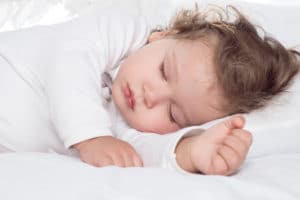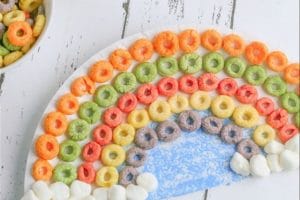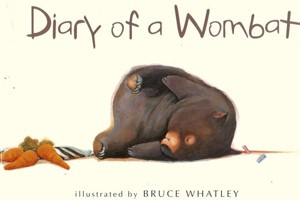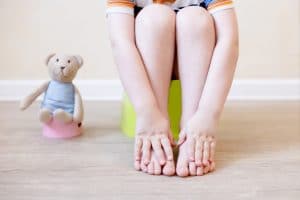Expert tips by Jan Jones (Early Childhood Educator)
AT 12 MONTHS
Developmental milestones
Fine motor skills
- Moves objects from one hand to another
- Drops and picks up small objects using thumb and finger
Gross motor skills
- Sits without support
- Crawls on hands and knees
- Pulls self up and stands alone
- Walks around furniture/cot while holding on
Self-help skills
- Hold cup with two hands and drinks with help
- Eats finger food by self
- Picks up spoon by handle
Speech and language
- Recognises own spoken name
- Says ‘dad’, ‘mumma’ and a few other words
- Shows enjoyment in songs, music and books
Social skills
- Pushes unwanted things away
- Plays ‘peek-a-boo’ and ‘pat-a-cake’
- Reaches for familiar people
Ideas for home
Communication
Sing songs and nursery rhymes, and read books to your baby. You can start as soon as they are born. Sing at bath time, nappy changes, playtime/tummy time on the floor and when reading books. Try baby massage if you and your baby enjoy this time together.
Social
Let friends and other trusted adults interact with your baby. Try not to become too over-protective when stranger anxiety surfaces. The more opportunities your baby has to interact with others on familiar ground, the more quickly the fear will be overcome, and he/she learns that they can be with others and return safely to mum or dad.
1- 2 YEARS
Developmental milestones
Fine motor skills
- Scribbles with crayon
- Turns pages of a book, 2 or 3 at a time
- Throws a small ball
Gross motor skills
- Walks alone
- Kicks a ball
- Walks up and down stairs with hand held
Self-help skills
- Takes off open coat or shirt without help
- Eats with a spoon
- Drinks from a cup
Speech and language
- Says the names of simple body parts such as eye and nose
- Understands simple sentences e.g. “Where’s your hat?”
- Tries simple sentences such as “Milk all gone”.
Social skills
- Gives kisses or hugs
- Waves goodbye
- Usually responds to “No!” or “Don’t touch”.
Ideas for home
Play
- Play lets children practice new skills such as hand skills, social skills and movement.
- Give your child lots of safe things to explore so she/he can feel, taste, listen, smell, hold shake, move, etc.
Movement
This is a time to explore the movements your baby can do. Try crawling through a tunnel made with a blanket and coffee table, or try chasing a rolled ball – either crawling or walking.
Emotional
Give your child plenty of affection: children feel good about themselves when they are loved. Plenty of hugs, kisses and cuddles make children feel wanted and valued.
2 – 3 YEARS
Developmental milestones
Gross motor skills
- Throws small ball
- Stops and starts with ease and avoids obstacles
Fine motor skills
- More fine motor control
- Turns pages in books one at a time
Self-help skills
- Enjoys learning new skills
- Beginning to understand danger
- Undresses and beginning to dress self
- Uses spoon and fork
Speech and language
- Rapid language development
- Enjoys rituals e.g. same stories, routines
- Beginning to say “please” and “thank-you”.
- Make-believe play with objects
Social and emotional development
- Easily frustrated e.g. “me do it myself”
- Has difficulty with transition from one activity to another e.g. play time to bath time
- Showing more independence but still largely dependent on adult support
- Starting to share but not consistently
Ideas for home
Play
- Child-sized furniture plus cardboard boxes of all sizes
- Simple dress-ups such as hats and bags
- Crayons and paper
Movement
- Child-sized clothes-line plus pegs
- Threading activities with large beads and shoelaces
Emotional
- Play telephones, other ‘realistic’ toys for pretend play
- Try to distract with talk or activity when child is showing frustration
- Own space and storage facilities for toys that they do not wish to share
- Provide plenty of opportunities to play with other children
3 – 4 YEARS
Developmental milestones
Gross motor skills
- Some incoordination of motor skills e.g. stumbling, falling, fear of heights
- Somersaults, jumps over rope, hops 2-3 times (usually only able to do with one leg)
Fine motor skills
- Imitates finger plays
- Cuts with safety scissors and pastes pictures
- Holds pencil with thumb and first two fingers and draws person with head, body, arms and legs
Self-help skills
- Experiments and tests limits
- Pours from small jug
- Goes to toilet with support when needed
- Takes socks and shoes off by self
Speech and language
- Sense of humour emerges
- “Why” is favourite word
- Asks lots of questions and continues to seek more information
Social and emotional skills
- Extremely demanding with adults e.g. “don’t talk”, “don’t look”.
- Prefers to play in small groups.
- Reveals feeling in dramatic play.
- Can share and cooperate sometimes.
Ideas for home
Play
- Puppets and felt-boards
- Letter and number play
- Role-play dress-ups
Movement
- Woodworking tools and wood
- Bat and ball
Emotional
- More detailed books
- A wide range of craft materials and space to use them
4 – 5 YEARS
Developmental milestones
Gross motor skills
- Walks up and down stairs alone, changing feet
- Jumps forward several times
- Hops on one foot without help
- Swings on swing without help
Fine motor skills
- Starting to recognise and copy own written name
- Draws a face showing at least 3 parts (head, eyes, nose, mouth).
- Copies a cross and a square reasonably accurately
Self-help skills
- Can do up buttons
- Goes to the toilet without help
Speech and language
- Uses sentences of about 6 words with correct grammar
- Understands opposites such as ‘wet’ and ‘dry’ and ‘high’ and ‘low’.
- Follows longer instructions e.g. “Stand up, get you shoes and wait by the door”.
Social skills
- Follows simple rules in board games
- Co-operates and negotiates in play
- Describes and talks about own feelings.
Ideas for home
Learning
There are many opportunities for learning in the family home for children of all ages. Day to day interactions between children and parents provide exciting discoveries. Try cooking together or exploring the garden.
Pre-writing skills
All letters and numbers are based on these shapes.
I — O + / X
Practising these shapes and creative drawing like drawing a person, house or car will help your child with writing.
Gross motor
To help develop body awareness (knowing where the body, arms, legs, head, etc. are in space), encourage pushing and pulling activities (tug of war); statue games (freezing like a statue when the music stops) and using different textured materials on your child’s body.
Speech and language
Ask your child to tell you the steps that are involved in some common daily activities e.g. making breakfast, getting dressed, etc.
EVERY CHILD NEEDS
- to be happy
- to be loved
- to live with dignity
- to be accepted
- to be successful
- To create and learn
- to explore
- to enjoy friendships
- to experience a warm supportive environment.
What stage is your child at right now?













